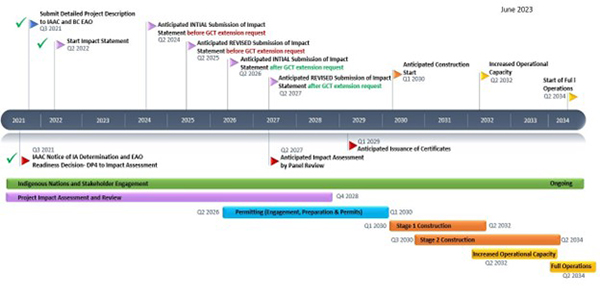Further to our last communication in April, GCT writes to update you on the next steps with respect to the Deltaport Expansion Berth Four (DP4) project.
Implications of the Roberts Bank Terminal 2 (RBT2) project decision to DP4
GCT is continuing to examine Canada’s decision and the unprecedented 370 conditions placed on the Vancouver Fraser Port Authority's proposed RBT2 project.
We, along with our technical experts, have assessed the impacts of the conditions to our understanding of RBT2's business case, and we remain convinced that the RBT2 project will not deliver competitive or timely container capacity to Canada’s Pacific Gateway. Furthermore, we also need to assess the conditions to identify which ones may be relevant to the DP4 project, to be able to incorporate them into our impact assessment.
Indigenous concerns about terminal expansion projects and cumulative effects
With respect to DP4's advancement, as you are aware, over the past four years GCT has engaged with 52+ Indigenous nations and communities to advance DP4 through the federal and provincial impact assessment process (Impact Assessment Process).
We heard from many Indigenous communities that they:
- do not want two container terminal expansion projects developed at Roberts Bank.
- are concerned with the current level of understanding, assessment, and/or management of cumulative effects on their Indigenous Interests.
Advancing in a responsible way requires more time for engagement and assessment
Based upon our conversations with Indigenous nations and stakeholders and the feedback we have received, GCT will be seeking additional time to work with rights holders and stakeholders to undertake the DP4 assessment.
This additional time will help to address timing pressures inherent in the Impact Assessment Process. Subsection 19(1) of the Impact Assessment Act requires a proponent to provide the Impact Assessment Agency of Canada (Agency) with the information or studies set out in the notice of commencement within three years after the day on which a copy of that notice is posted on the Agency site, which, for DP4, occurred on May 31, 2022. Therefore, the current deadline for GCT to provide the complete Impact Statement for DP4 is May 31, 2025. However, the Agency and the British Columbia Environmental Assessment Office (EAO) request approximately a year to complete their review of the Impact Statement and seek feedback from relevant parties. As such, under the current timelines, GCT would need to submit its complete Impact Statement to the Agency and the EAO by May 31, 2024.
Many Indigenous nations have expressed concern with this timeframe and the ability to undertake a meaningful assessment of the impacts to their Indigenous Interests given the current information gaps and their resource constraints.
An extension to the timeline
GCT is requesting a 24-month extension of the Impact Statement phase of the Impact Assessment Process. GCT engaged about the extension request prior to making the formal request to the Agency and the EAO.
The extension request is in accordance with the draft Agency and EAO Cooperation Agreement and the relevant legislation. If the request is granted, then GCT will use the extension period to:
- further engage with Indigenous communities and new leadership at the Vancouver Fraser Port Authority as well as various government departments to identify pathways for the DP4 project in the new context of cumulative effects.
- assess the 370 conditions outlined by the government for the RBT2 project and identify which ones may be relevant to the DP4 project, to be able to incorporate them into the impact assessment.
- assess the implications of cumulative effects and engage with Indigenous Nations on them. GCT is hopeful that Transport Canada’s examination of the Cumulative Effects of Marine Shipping will also support this assessment.
- Investment of significant resources into the DP4 assessment process.
- Successful advancement through the Planning Phase, seeking consensus along the way, and working closely with 52+ Indigenous nations, the public, and regulators to inform the Joint Guidelines, the Joint Indigenous Engagement and Partnership Plan, the Joint Assessment Plan and the Joint Permitting and Regulatory Coordination Plan.
- The completion of over 300 field studies, to collect data to inform the Impact Statement.
- Direct collaboration with Indigenous nations, federal and provincial authorities.
- Initial steps to create a Marine Regulatory Advisory Group to understand how best to collaborate on the assessment of DP4's effects on the marine environment.
